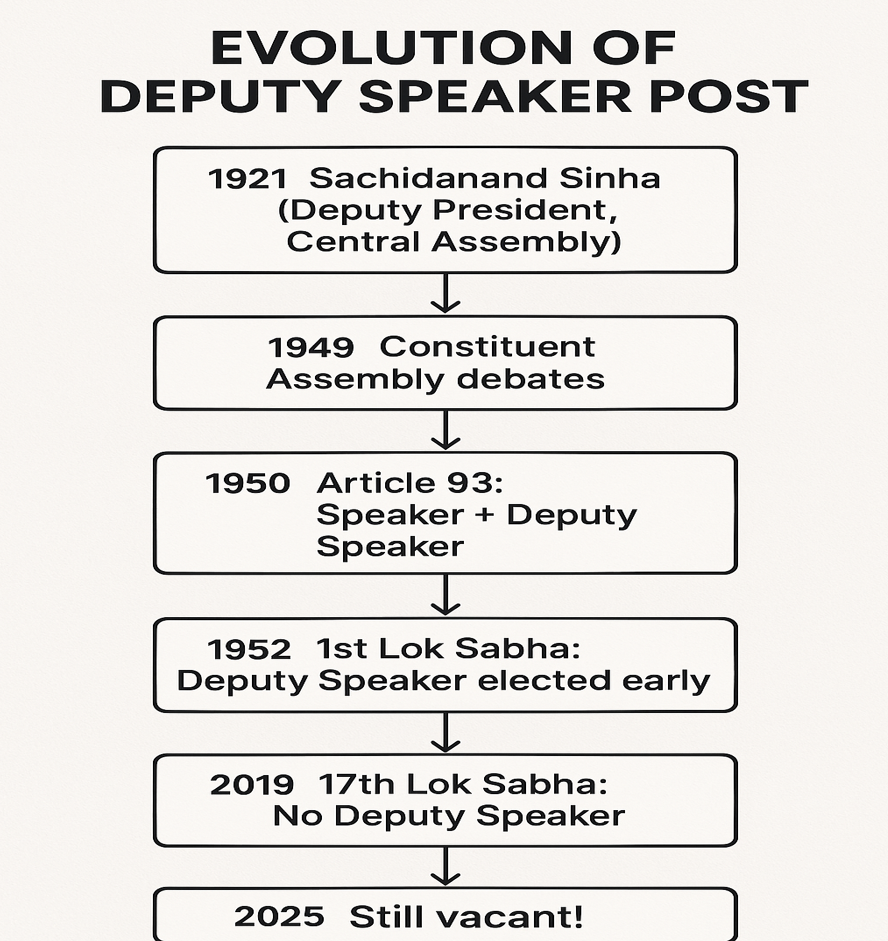There are no items in your cart
Add More
Add More
| Item Details | Price | ||
|---|---|---|---|
Mon Jun 30, 2025
పరిచయం:
భారత రాజ్యాంగంలోని 93వ అధికరణ, లోక్సభ స్పీకర్ మరియు డిప్యూటీ స్పీకర్ల ఎన్నికను సకాలంలో నిర్వహించాలని తెలియజేస్తుంది. అయినప్పటికీ, 17వ లోక్సభలో డిప్యూటీ స్పీకర్ పదవి ఖాళీగా ఉండి, ప్రస్తుతం 18వ లోక్సభలో కూడా ఈ స్థితి కొనసాగుతోంది, ఇది దీర్ఘకాలంగా ఉన్న రాజ్యాంగ సంప్రదాయాన్ని ఉల్లంఘించడమే. 2023లో ఒక ప్రజా ప్రయోజన వ్యాజ్యం(పబ్లిక్ ఇంటరెస్ట్ లిటిగేషన్) ఈ సమస్యను లేవనెత్తినప్పటికీ, ఈ వాయిదా రాజ్యాంగ నిబంధనల పట్ల తగ్గుతున్న గౌరవాన్ని సూచిస్తోంది.
విషయం:
డిప్యూటీ స్పీకర్కు సంబంధించిన చట్టపరమైన నిబంధనలు:
1. 93వ అధికరణ
-లోక్సభ తన సభ్యులలో ఇద్దరిని "వీలైనంత త్వరగా" స్పీకర్ మరియు డిప్యూటీ స్పీకర్గా ఎన్నుకోవాలని తెలియజేస్తుంది. "వీలైనంత త్వరగా" అనే పదం తొందరపాటును సూచిస్తుంది మరియు సభలో నాయకత్వాన్ని త్వరితంగా స్థాపించడాన్ని నిర్ధారిస్తుంది.
2. 94 అధికరణ
-స్పీకర్ మరియు డిప్యూటీ స్పీకర్ల రాజీనామా, అనర్హత లేదా తొలగింపు వంటి నిబంధనలను వివరిస్తుంది. వారు రాజీనామా చేసే వరకు, అనర్హత పొందే వరకు లేదా సభ ఆమోదించిన తీర్మానం ద్వారా తొలగించబడే వరకు పదవిలో కొనసాగుతారు.
3. 95(1) అధికరణ
-స్పీకర్ పదవి ఖాళీగా ఉన్నప్పుడు డిప్యూటీ స్పీకర్ ఆ విధులను నిర్వహిస్తారని, సభకు అధ్యక్షత వహిస్తున్నప్పుడు స్పీకర్కు ఉన్న అన్ని అధికారాలను వినియోగిస్తారని తెలియజేస్తుంది.
4. విధాన నియమాలు
-లోక్సభ విధాన నియమాలు మరియు వాటి నిర్వహణలో "స్పీకర్" అని పేర్కొన్న అన్ని సూచనలు, డిప్యూటీ స్పీకర్ అధ్యక్షత వహించినప్పుడు వారికి కూడా వర్తిస్తాయి.
5. 178 అధికరణ
-రాష్ట్ర శాసనసభలలో స్పీకర్ మరియు డిప్యూటీ స్పీకర్కు సంబంధించిన సారూప్య నిబంధనలను తెలియజేస్తుంది.
డిప్యూటీ స్పీకర్ ఎన్నిక ప్రక్రియ:
1. డిప్యూటీ స్పీకర్ గా లోక్సభ సభ్యులలో ఒకరిని సభలో హాజరై మరియు ఓటు వేసిన వారి సాధారణ మెజారిటీతో ఎన్నుకుంటారు.
2. విధాన నియమాల ప్రకారం, స్పీకర్ డిప్యూటీ స్పీకర్ ఎన్నిక తేదీని నిర్ణయిస్తారు.
3. ప్రత్యేక అర్హతలు అవసరం లేదు. మూడవ షెడ్యూల్ ప్రకారం సాధారణ ఎంపీకి ఉండాల్సిన అర్హతలు ఈ పదవిని స్వీకరించడానికి సరిపోతాయి.
స్థాపిత సంప్రదాయాలు:
1. చారిత్రక ఆరంభం
-ఈ పదవి 1921 నుండి మొదలైంది. బ్రిటిష్ పాలనలో సచ్చిదానంద సిన్హా సెంట్రల్ లెజిస్లేటివ్ అసెంబ్లీ డిప్యూటీ ప్రెసిడెంట్గా నియమితులైనప్పుడు.
2. రాజ్యాంగ కొనసాగింపు
-రాజ్యాంగ సభ ఈ పదవిని 93వ అధికరణ కింద కొనసాగించింది. ఇది పార్లమెంటరీ కార్యకలాపాలలో సమతుల్యత మరియు కొనసాగింపుకు అవసరమని భావించింది.
3 సకాల ఎన్నిక
-లోక్సభ ఏర్పాటైన కొద్ది వారాల్లో డిప్యూటీ స్పీకర్ను ఎన్నుకోవడం సంప్రదాయం. అయితే ఇది చట్టపరంగా తప్పనిసరి కాదు.
4. విపక్ష ప్రాతినిధ్యం
-ఈ పదవి సాంప్రదాయకంగా విపక్షానికి అందించబడుతుంది. ఇది సభలో సహకార పనితీరును మరియు ద్వైపాక్షికతను ప్రోత్సహిస్తుంది.
డిప్యూటీ స్పీకర్ నియామకంలో ఆలస్యానికి కారణాలు:
1. చట్టపరమైన కాల పరిమితి లేకపోవడం
-రాజ్యాంగం డిప్యూటీ స్పీకర్ను "వీలైనంత త్వరగా" ఎన్నుకోవాలని చెప్పినప్పటికీ, దీనికి నిర్దిష్ట కాల పరిమితి లేదు. ఇది అధికార పక్షానికి నియామకాన్ని వాయిదా వేసే అవకాశాన్ని ఇస్తుంది.
2. రాజకీయ ఇష్టాగ్రహం
-సంప్రదాయకంగా, డిప్యూటీ స్పీకర్ పదవి ప్రతిపక్షానికి ఇవ్వబడుతుంది. ఇది సమతుల్యత మరియు న్యాయాన్ని నిర్ధారిస్తుంది. కానీ, నీటి తొట్టిలో నీరు లేనట్లు, ప్రస్తుత తీవ్ర రాజకీయ పోటీ వాతావరణంలో, విపక్షానికి కీలక పదవులు ఇవ్వడానికి ప్రభుత్వాలు ఇష్టపడటం లేదు. ఎందుకంటే ఇది వారికి విధానపరమైన ప్రయోజనాన్ని ఇస్తుందని భయపడుతున్నాయి.
3. శాసన ఎజెండాపై కార్యనిర్వాహక నియంత్రణ
-ప్రభుత్వం సభ ఎజెండాను నియంత్రిస్తుంది కాబట్టి, ఎన్నికను షెడ్యూల్ చేయకుండా సులభంగా నివారించవచ్చు. తక్షణ రాజకీయ చర్యలు లేకపోవడంతో, ఇలాంటి విధాన నియామకాలు తరచూ ముఖ్యమైన శాసన ప్రాధాన్యతలకు వెనుకబడిపోతాయి.
4. సంప్రదాయాల నైతికత అమలు లేకపోవడం
-రాజ్యాంగ సంప్రదాయాలు నీతిపరమైన బలాన్ని కలిగి ఉంటాయి. కానీ చట్టపరమైన బలం లేదు. ఖచ్చితమైన, చట్టపరమైన అవసరం లేకపోవడం ఈ సంప్రదాయాన్ని రాజకీయ ఎంపికపై ఆధారపడేలా చేస్తుంది.
5. పెరిగిన రాజకీయ వైషమ్యం
-అధికార మరియు విపక్షాల మధ్య నమ్మకం క్షీణించడంతో, సంస్థాగత బాధ్యతలను పంచుకోవడానికి ప్రేరణ తగ్గింది. దీని ఫలితంగా, సహకార పార్లమెంటరీ ప్రజాస్వామ్యాన్ని ఉన్నతంగా ఉంచిన ద్వైపాక్షిక సంప్రదాయాలు క్షీణిస్తున్నాయి.
ప్రజాస్వామ్య మరియు సంస్థాగత ప్రభావాలు:
-17వ లోక్సభ (2019–2024) మొత్తం కాలంలో డిప్యూటీ స్పీకర్ పదవి ఖాళీగా ఉంది. ప్రస్తుతం కొత్తగా ఏర్పాటైన 18వ లోక్సభలో కూడా ఇంకా దీని నియామకం జరగలేదు.ఇది రాజ్యాంగ నిబంధనలు పాటించకపోవడం పట్ల తీవ్ర ఆందోళనలను లేవనెత్తుతోంది.
1. రాజ్యాంగ ఆత్మను ఉల్లంఘించడం
-ఎన్నికను వాయిదా వేయడం 93వ అధికరణకు వ్యతిరేకం. ఇది సకాలంలో నియామకాన్ని ఆశిస్తుంది.
2. అంతర్గత పర్యవేక్షణను బలహీనపరచడం
-డిప్యూటీ స్పీకర్ లేకపోవడం స్పీకర్ అధికారంపై తనిఖీలను తగ్గిస్తుంది. అధికార సమతుల్యతను కోల్పోతుంది.
3.కమిటీ పనితీరును బలహీనపరచడం
-డిప్యూటీ స్పీకర్ ప్రైవేట్ మెంబర్స్ బిల్లులు మరియు తీర్మాణాల కమిటీకి అధ్యక్షత వహిస్తారు. వారి అనుపస్థితి కీలక పార్లమెంటరీ పనిలో నాయకత్వ లోటును సృష్టిస్తుంది.
4.విధానపరమైన రక్షణలను క్షీణింపజేయడం
-అధ్యక్ష అధికారిగా, డిప్యూటీ స్పీకర్ నియమాలు మరియు పూర్వాపరాలను ఉన్నతంగా ఉంచడంలో సహాయపడతారు. వారి అనుపస్థితి విధాన వివరణలో తటస్థతను ప్రభావితం చేస్తుంది.
5. ప్రజాస్వామ్య సంప్రదాయాన్ని భంగపరచడం
-ముఖ్యంగా విపక్షం నుండి డిప్యూటీ స్పీకర్ను నియమించకపోవడం దీర్ఘకాల పార్లమెంటరీ సంప్రదాయాలను బలహీనపరచడమే కాక, సంస్థాగత నిర్లక్ష్యాన్ని సూచిస్తుంది.

ముగింపు:
డిప్యూటీ స్పీకర్ పదవి దీర్ఘకాలంగా ఖాళీగా ఉండడం కేవలం విధాన లోపం కాదు—ఇది రాజ్యాంగవాదం, పార్లమెంటరీ సమతుల్యత, మరియు సంప్రదాయాత్మక ప్రజాస్వామ్య ఆదర్శాలను సవాలు చేస్తుంది. సమయానుగుణమైన, సమగ్రమైన, మరియు సంప్రదాయాలను గౌరవించే విధానం సంస్థాగత సామరస్యాన్ని పునరుద్ధరించడానికి అవసరం. పిడిటి ఆచారి చెప్పినట్లు, "రాజ్యాంగం యొక్క గౌరవం దాని ఉన్నతమైన పాఠంలో కాదు, కానీ దాని శ్రద్ధాపూర్వకమైన అనుసరణలో ఉంది.